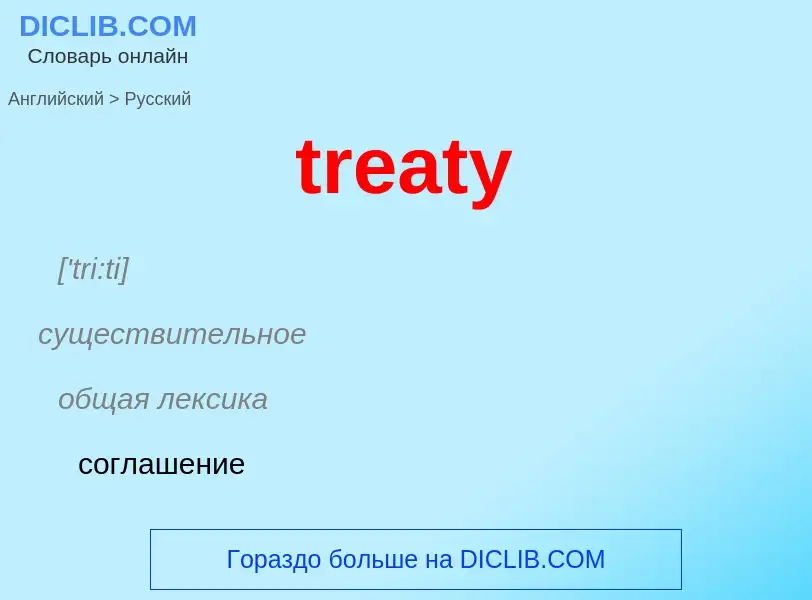Traducción y análisis de palabras por inteligencia artificial ChatGPT
En esta página puede obtener un análisis detallado de una palabra o frase, producido utilizando la mejor tecnología de inteligencia artificial hasta la fecha:
- cómo se usa la palabra
- frecuencia de uso
- se utiliza con más frecuencia en el habla oral o escrita
- opciones de traducción
- ejemplos de uso (varias frases con traducción)
- etimología
Treaty - traducción al ruso
['tri:ti]
существительное
общая лексика
соглашение
договор
сделка
контракт
договорный, существующий на основании договора
устаревшее выражение
переговоры
синоним
Wikipedia

A treaty is a formal, legally binding written agreement between actors in international law. It is usually made by and between sovereign states, but can include international organizations, individuals, business entities, and other legal persons. A treaty may also be known as an international agreement, protocol, covenant, convention, pact, or exchange of letters, among other terms. However, only documents that are legally binding on the parties are considered treaties under international law. Treaties vary on the basis of obligations (the extent to which states are bound to the rules), precision (the extent to which the rules are unambiguous), and delegation (the extent to which third parties have authority to interpret, apply and make rules).
Treaties are among the earliest manifestations of international relations, with the first known example being a border agreement between the Sumerian city-states of Lagash and Umma around 3100 BC. International agreements were used in some form by most major civilizations, growing in both sophistication and number during the early modern era. The early 19th century saw developments in diplomacy, foreign policy, and international law reflected by the widespread use of treaties. The 1969 Vienna Convention on the Law of Treaties codified these practices, setting forth guidelines and rules for creating, amending, interpreting, and terminating treaties and for resolving disputes and alleged breaches.
Treaties are roughly analogous to contracts in that they establish the rights and binding obligations of the parties. They vary significantly in form, substance, and complexity and govern a wide variety of matters, such as security, trade, environment, and human rights. Treaties may be bilateral (between two countries) or multilateral (involving more than two countries). They may also be used to establish international institutions, such as the International Criminal Court and the United Nations, for which they often provide a governing framework. Treaties serve as primary sources of international law and have codified or established most international legal principles since the early 20th century.
Notwithstanding the Law of Treaties and customary international law, treaties are not required to follow any standard form. Nevertheless, all valid treaties must comply with the legal principle of pacta sunt servanda (Latin: "agreements must be kept"), under which parties are committed to perform their duties and honor their agreements in good faith. A treaty may also be invalidated, and thus rendered unenforceable, if it violates a preemptory norm (jus cogens), such as permitting a war of aggression or crimes against humanity.


![A treaty delegation of the [[Mdewakanton]] and [[Wahpekute]] indigenous tribes to Washington, D.C. (1858) A treaty delegation of the [[Mdewakanton]] and [[Wahpekute]] indigenous tribes to Washington, D.C. (1858)](https://commons.wikimedia.org/wiki/Special:FilePath/1858 Treaty Delegation Mdewakanton crop.jpg?width=200)
![plenipotentiaries]] with "full power" to conclude a treaty, is often sufficient to manifest an intention to be bound by the treaty. plenipotentiaries]] with "full power" to conclude a treaty, is often sufficient to manifest an intention to be bound by the treaty.](https://commons.wikimedia.org/wiki/Special:FilePath/Geneva Conventions - signing in 1949.jpg?width=200)
![The [[International Court of Justice]] is often called upon to aid in the interpretation or implementation of treaties. The [[International Court of Justice]] is often called upon to aid in the interpretation or implementation of treaties.](https://commons.wikimedia.org/wiki/Special:FilePath/International Court of Justice 1979.jpg?width=200)
